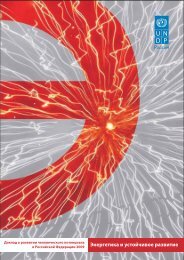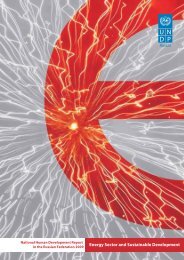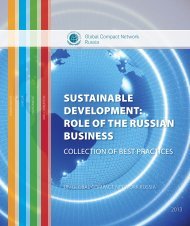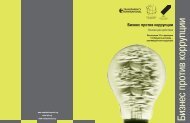Japan (100, 63 and 47 GW respectively). The numberof new nuclear power stations currently underconstruction is quite modest, but plans for futureconstruction are ambitious. Nuclear stations in Chinacurrently have total capacity of 9 GW, but this shouldincrease to at least 40 GW by 2020 and possibly to amuch higher level of 70 GW.Bad heritage problemsSome of the problems the industry has todeal with today have to do with the past rather thanthe future. The principal nuclear powers, particularlythe US and <strong>Russia</strong>, are burdened with a negativenuclear heritage from the Cold War arms race, whilethe heritage problem for atomic power generation assuch concerns handling of spent nuclear fuel andradioactive waste. In practice, until the late 1980s, thenuclear industry put off resolution of this issue: spentfuel and radioactive waste was allowed to accumulatewithout organisational, technical or economicsolutions for permanent storage.In recent years many nations have passedappropriate laws, introduced necessary financialmechanisms and begun implementing programmesto build facilities for recycling spent nuclear fuel andradioactive waste. Today these issues are being giventop priority, and not only by national legislation: onSeptember 5, 1997 a diplomatic conference of theInternational Atomic Energy Agency in Vienna sealedthe Joint Convention on the Safety of Spent FuelManagement and on the Safety of Radioactive WasteManagement, which imposes a number of obligationson the nations that ratified it. <strong>Russia</strong> ratified thisConvention in 2005.<strong>Russia</strong> is taking practical steps to deal with itsnuclear heritage as part of the federal targetprogramme, ‘Ensuring nuclear and radioactive safetyin 2008 and the period until 2015’. The programmecalls for creation of infrastructure for handling spentnuclear fuel and radioactive waste from thermalreactors, and appropriate legislation is also beingdeveloped, most importantly a new federal law onhandling of radioactive waste, a draft version of whichhas already been prepared. The main goal of this lawis to create financial mechanisms for handlingradioactive waste on a long-term basis and to takeinventory of waste that has accumulated so far, whereit is stored, and the conditions of storage, so thatdecisions can be made about what to do with it in thefuture.Long-term challengesThe design of modern reactors anticipatesvery long service lives, of 50-60 years. However, whathas to be taken into account is not only the period,during which a reactor will be in use, but also itsdecommissioning, construction of facilities for safedisposal of radioactive waste, creation of a closed fuelloop and a financial system to support all theseactivities for years to come.Nuclear power is a knowledge-intensiveand high technology industry. Generating electricityusing reactors running on thermal neutrons is nowa standardized industrial technique and in thissense it is an ‘old’ technology, even though it can beclassed as high-tech. Further refinement of thistechnology, primarily to optimize its economic andphysical parameters, has its limits. The fuel reservefor thermal-neutron reactors is restricted by limitedreserves of Uranium 235. Such reactors only use 1%of the uranium and as a consequence they byproducesignificant quantities of underused nuclearfuel. The handling of spent nuclear fuel significantlyincrease the cost of the fuel cycle of a nuclear powerstation.While looking for solutions to its mediumtermproblems, the nuclear power industry must alsothink about its long-term prospects. Developmentand adoption of a new technology in the nuclearindustry takes a very long time, sometimes severaldecades. In effect, therefore, the introduction of newnuclear technology can span several generations,making it impossible to tell which of the new ideasproposed today will be in demand in decades tocome.Set to growFor <strong>Russia</strong> to sustain its current level of powergeneration, it has to launch new capacity to replacethe power stations that are going offline. At present40% of the country’s total power generating capacity118 National Human Development <strong>Report</strong> in the <strong>Russia</strong>n Federation 2009
consists of out-dated equipment at fuel-fired powerstations. By 2020, 57% of these stations will haveexceeded their design service life.<strong>Russia</strong>’s nuclear power industry has 31 powergenerating units with total capacity of 23 GW andcurrently generates 16% of all electric powerconsumed in the country. In European <strong>Russia</strong> theshare of nuclear power is almost twice higher, at 30%.The design service life of the power generating unitsis 30 years. Even though in the original design it wasexpected that this service life could be extended by10-20 years, <strong>Russia</strong> has to build new capacity simplybecause, sooner or later, the older nuclear reactors willhave to be decommissioned.However, <strong>Russia</strong> is on an economic growthtrajectory, which will have to be supported by increaseof power generation, and the power generationsolutions need to be implemented long beforedemand for more power rises. New facilities cannot bebuilt quickly from scratch for purely technical reasons,let alone other considerations. In the nuclear industryit takes a minimum of between five and six years tocomplete a single power generating unit after the sitehas already been surveyed and prepared (thepreparatory stage can also take years). So the sort ofnuclear power industry we will have in 10-20 years isto a large extent determined by decisions we tookyesterday and are taking now.<strong>Russia</strong>’s energy strategy up to 2020 is basedon a number of basic scenarios describing thecountry’s social and economic development in yearsto come. The official energy strategy assumes thatthe fuel-energy balance will need to be optimizedand that increase in the country’s demand forelectricity will best be met by creating additionalnuclear power capacity, primarily in European <strong>Russia</strong>.The amount of electricity generated by nuclearpower stations must grow from 130 billion kilowatthours in 2000 to 300 billion kilowatt hour in 2020 inthe best case economic-growth scenario and to 220kilowatt hours if a more moderate scenario plays out.This means that the capacity of nuclear powerstations will have to double while the share ofnuclear power in total electricity production willincrease to 23%.One of the main principles of the officialgovernment plan for deployment of electric powerfacilities up to 2020 is maximum possible increase inthe share of facilities not dependent on fossil fuels, i.e.nuclear and hydro-electric power stations.Development of nuclear power would beimpossible without the following prerequisites:• Availability of appropriate designs andtechnologies;• Acceptable levels of safety;• Nuclear power stations must have certainenvironmental advantages over powergeneration using fossil fuel.<strong>Russia</strong> is currently building nine nuclearpower generation units at home and abroad. Thebackbone of the country’s nuclear powerdevelopment in the coming decade will be the newstandard power generating unit using a VVER-1200(AES-2006) reactor.New technologies<strong>Russia</strong>n President Dmitry Medvedev hasincluded improvement of nuclear technologiesamong the country’s five main technologydevelopment priorities 7 . Thanks to large-scaleresearch carried out in the past, <strong>Russia</strong> has all thenecessary tools for creating a new nuclear technology.The new technology must meet several keyrequirements, as follows:• it must be safe;• it must be competitive with other technologies;• it must not be reliant on limited fuel reserves;• it must be environment friendly;• it must help solve nuclear non-proliferation tasks.All these requirements are met by newtechnologies based on use of fast reactors in a closedfuel loop.Fast reactors, also known as fast neutronreactors, represent a strategic innovation in thenuclear energy sector. Five countries (<strong>Russia</strong>, France,Japan, India and China) have achieved mostsignificant results in development of thistechnology, and <strong>Russia</strong> is leading the way thanks tocompletion of the Beloyarsk nuclear power station,7Dmitry Medvedev: ‘Forward, <strong>Russia</strong>!’. September 10, 2009.119
- Page 1 and 2:
National Human Development Reportin
- Page 3 and 4:
National Human Development Reportin
- Page 5 and 6:
ACKNOWLEDGEMENTSThe authors express
- Page 7 and 8:
Dear Reader,You have before you the
- Page 9 and 10:
PREFACEThis is the 13 th National H
- Page 11 and 12:
country’s fuel & energy regions r
- Page 13 and 14:
environmental degradation and enhan
- Page 15 and 16:
Chapter 1The Energy Sector,the Econ
- Page 17 and 18:
By 2008 Russia had increased its sh
- Page 19 and 20:
the share of energy in the national
- Page 21 and 22:
exported, increased. However, this
- Page 23 and 24:
elimination of structural and terri
- Page 25 and 26:
• Establishment of competitive me
- Page 27 and 28:
number of developed countries, incl
- Page 29 and 30:
Although the United Nations Climate
- Page 31 and 32:
industrial region of the Urals - Sv
- Page 33 and 34:
2.2. Budget capacityand structure o
- Page 35 and 36:
(the Federal State Statistics Servi
- Page 37 and 38:
Immigration by young and highly ski
- Page 39 and 40:
energy regions exacerbate the incom
- Page 41 and 42:
Khanty-Mansi and Yamal-Nenets Auton
- Page 43 and 44:
the Ministry for Regional Developme
- Page 45 and 46:
various other long-term problems in
- Page 47 and 48:
is also associated with the fuel an
- Page 49 and 50:
Republic of Mordovia 8051 0.732 68.
- Page 51 and 52:
Legislative control of impact audit
- Page 53 and 54:
Chapter 3Personal Incomes, the Ener
- Page 55 and 56:
than any other sources of income -
- Page 57 and 58:
Are wages now the main instrument f
- Page 59 and 60:
comparison of month-on-month develo
- Page 61 and 62:
• The unemployed, people who aree
- Page 63 and 64:
Employment in the energy sector acc
- Page 65 and 66:
The share of household expenditures
- Page 67 and 68:
subsidization practices in the regi
- Page 69 and 70: in power use between regions now de
- Page 71 and 72: Electricity prices for households h
- Page 73 and 74: • Steady decrease in the percenta
- Page 75 and 76: 1. The number of graduates with eng
- Page 77 and 78: As well as requiring better fuelcom
- Page 79 and 80: Box 4.1. The village of Kolvain Uss
- Page 81 and 82: continue to use solid fuel for a lo
- Page 83 and 84: Box 4.3. Ambient air pollution andp
- Page 85 and 86: either by large power generating fa
- Page 87 and 88: Box 4.6. A city at riskNovocherkass
- Page 89 and 90: In order to assess impact of thesee
- Page 91 and 92: generation facilities through safer
- Page 93 and 94: achieved in developed countries. So
- Page 95 and 96: equires 2-6 times more capital inve
- Page 97 and 98: government) should set targets and
- Page 99 and 100: networks. In 2007 government budget
- Page 101 and 102: enhancement is also important. Ener
- Page 103 and 104: energy efficiency of the transport
- Page 105 and 106: Box 5.1. Programme of the Ministry
- Page 107 and 108: educational and informational suppo
- Page 109 and 110: mechanism for using national quota
- Page 111 and 112: Figure 6.2Share of electricity gene
- Page 113 and 114: One of the major benefits of renewa
- Page 115 and 116: odies; outdoor air; rocks and soil;
- Page 117 and 118: Design and construction of geotherm
- Page 119: Box 6.3. Prospects for nuclear powe
- Page 123 and 124: ConclusionThe world’s nuclear pow
- Page 125 and 126: 7.1. Impact of the fuel& energy sec
- Page 127 and 128: Table 7.5Solid waste from productio
- Page 129 and 130: Table 7.7Areas of disturbed and rec
- Page 131 and 132: nature of the impact (atmospheric e
- Page 133 and 134: Further, the economic cost ofenviro
- Page 135 and 136: trends continued the damage would a
- Page 137 and 138: What the government needs to do ino
- Page 139 and 140: Figure 7.2.1Specific atmospheric em
- Page 141 and 142: money value of industrial output) c
- Page 143 and 144: Figure 7.2.4Trends in specific atmo
- Page 145 and 146: Chapter 8The Energy Industry and Su
- Page 147 and 148: eing equal) it only reflects that p
- Page 149 and 150: (MDGs), issued by the UN in 2000. T
- Page 151 and 152: 8.4. The energy factorin integral i
- Page 153 and 154: Canada, the USA and Great Britain h
- Page 155 and 156: Box 8.2. Energy efficiencyindicator
- Page 157 and 158: Box 8.4. Energy efficiency rating o
- Page 159 and 160: 41 Penza Region 116.0 -35.2 -4.542
- Page 161 and 162: Appendix to Chapter 1Table 1.1. GDP
- Page 163 and 164: Attachment to Chapter 4Table 4.1Rus
- Page 165 and 166: Attachment to Chapter 4Volga Federa
- Page 167 and 168: Attachment to Chapter 4Belovo Belov
- Page 169 and 170: The previous National Human Develop












